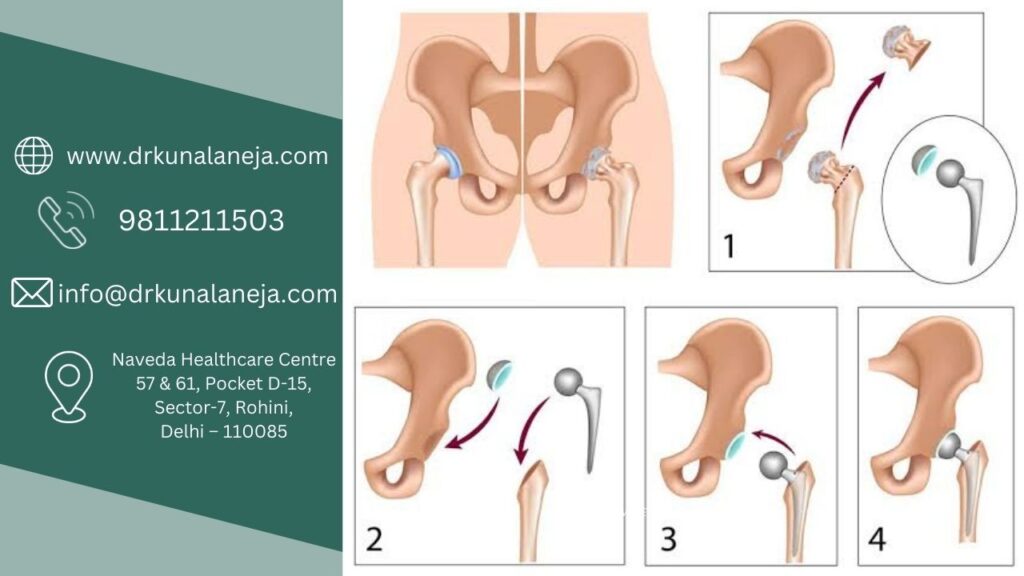
What is a Trauma Surgeon?
A trauma surgeon (also known as a critical care surgeon or an acute care surgeon) performs surgery to treat critical injuries or illnesses. Dr. Kunal Aneja is one of the Best Trauma Surgery Doctors In Rohini. In addition to helping you recover from a critical injury or an acute illness after a trauma surgery, an experienced trauma surgeon knows how to perform surgical procedures and handle a wide variety of injuries. An experienced trauma surgeon knows how to perform a variety of surgical procedures and handle a wide variety of injuries after trauma surgery.
Trauma surgeons are specialty physicians who perform emergency surgery on patients suffering from critical injuries or illnesses (also called critical care physicians or acute care doctors). A trauma surgeon who has a deep understanding of surgical procedures can help you recover from a critical injury or acute illness. An experienced trauma surgeon will help you manage different types of injuries and can assist you with different types of recovery.
What Does a Trauma Surgeon Treat?
Anesthesia procedures are used to stabilize and treat the patient following an injury. They are involved in diagnosing and repairing injuries caused by health problems. Anesthesia procedures should be used as soon as possible after the injury, so that the patient can be treated.
Depending on the nature of your illness or injury, the trauma surgeon may come into your care team. These surgeons usually perform surgery once an emergency room has been given admittance to you.
The following conditions may be treated by trauma surgeons:
Perforation or blunt force trauma
A blunt trauma is defined as a forceful impact to the body that damages the body, for example, if the person is involved in a motor vehicle accident, is injured in a fall, or is assaulted by someone. It is considered to be a type of blunt trauma.

Trauma Surgery Doctors In West Delhi
- TAKE A LOOK AT YOUR SYMPTOMS
- CONTACT A DOCTOR
- GET A DENTIST
- CONNECT WITH CARE
- FIND THE CHEAPEST DRUG PRICES
- A-Z of Health
- SUBSTITUTES & DRUGS
- LIVING A HEALTHY LIFE
- PREGNANCY AND FAMILY
- NEWS & EXPERTS
- MOBILE APPS
- SUBSCRIPTIONS
- PRIVACY AND MORE
- SUBSCRIBE
- A to Z Guides
What Does a Trauma Surgeon Treat?
During the course of their work, trauma surgeons diagnose and treat traumas that have been caused by emotional or physical traumas, as well as surgery. They must assess the patient’s condition rapidly as well as decide what type of surgery will be required.
Usually, trauma surgeons are the first people you meet at an emergency room. They treat injuries and illnesses by performing surgery if needed.
A trauma surgeon treats conditions such as:
Trauma caused by blunt or penetrating force
In a traumatic injury, there are two general types of injuries: penetrating trauma and blunt trauma. Penetrating trauma occurs when something penetrates the skin or other tissues, such as gunshot wounds, stab wounds, and farm machinery injuries.
Burns that cause severe burns can be treated surgically by a trauma surgeon through the use of emergency surgery, skin excision, and skin grafts. An emergency surgery for severe burns can involve immediate surgery, skin excision, and skin grafting.
A trauma surgeon treats conditions such as:
Trauma caused by blunt or penetrating force
In a traumatic injury, there are two general types of injuries: penetrating trauma and blunt trauma. Penetrating trauma occurs when something penetrates the skin or other tissues, such as gunshot wounds, stab wounds, and farm machinery injuries.
Burns that cause severe burns can be treated surgically by a trauma surgeon through the use of emergency surgery, skin excision, and skin grafts. An emergency surgery for severe burns can involve immediate surgery, skin excision, and skin grafting.
Emergencies & Acute Care in General Surgery
Medical emergencies can sometimes necessitate an immediate surgical procedure. In addition to appendicitis, diverticulitis, cholecystitis, perforated bowels, perforated ulcers, abdominal abscesses, incarcerated hernias, and bowel obstructions, trauma surgeons can also treat perforated ulcers, perforated bowels, and perforated ulcers.
As well as performing major surgery, trauma surgeons also provide surgical critical care in the hospital for patients who are undergoing another procedure or surgery in the hospital. These patients may be suffering from sepsis, respiratory failure, multi-organ failure, or coagulopathies, for example.
You will be rushed into surgery if you suffer from any of these injuries or illnesses. If your medical condition is severe, your trauma surgeon will determine your best course of treatment. If you suffer from any of these injuries or illnesses, you will be taken to the hospital immediately.
The following procedures may be used by a trauma surgeon based on the condition of your body:
- Laparoscopic exploration
- Thoracotomy in an emergency
- Providing resuscitation care
Stabilizing your condition requires a trauma surgeon, who either continues treating you while you recover or transfers your care to another doctor.
Understanding trauma and how it is treated
Trauma surgery refers to any form of surgery that involves treating injuries that have been sustained due to an impact from a car accident, or because a car has hit a child. The emergency room of the hospital may, for example, be contacted by a trauma surgeon if a child has sustained an injury as a result of a car accident.
Trauma explained
An injury caused by a blunt or penetrating force is commonly referred to as trauma. This is generally referred to as a trauma injury, and is generally referred to as a “major trauma.” Car crashes, stabbings, and gunshots are common causes of trauma. A fall can cause trauma in addition to injuries caused by falls, crushes, and the impacts of automobiles on pedestrians. In addition to the injuries caused by falls, there are also injuries that occur due to falls.
A person may suffer from trauma that affects their internal organs, bones, brains, as well as other soft tissues, as well as their bones and brains, among other soft tissues. It is common for individuals to be injured in accidents throughout the country and it can affect anyone at any time, whether it is as a result of a minor injury (hitting your finger with a hammer) or as a result of a major injury (being hit by a car travelling at high speed or falling from a building).
Surgery performed by trauma surgeons
In cases of severe trauma, such as a catastrophic car accident, trauma surgeons are often an integral part of the surgical team assisting with the surgery. Surgical procedures such as such include procedures by general surgeons to repair internal abdominal injuries, vascular surgeons to repair damaged blood vessels, orthopedic surgeons to repair broken bones, and others to assist in the repair of the injury.
A trauma team is not only composed of surgeons, but a number of other professionals, such as paramedics, anesthesiologists, respiratory therapists, registered nurses, and radiologists, along with laboratory personnel, and personnel from a blood bank as well.
Trauma surgery is a specialized field of surgical medicine that treats injuries caused by impact. Trauma surgeons may be called to the bedside of a crash victim after an impact to assess their injuries.
An explanation of trauma
Often, a trauma-affected individual has experienced a blunt force or a penetrating trauma. These types of injuries are sometimes referred to as “major traumas.” Most victims of trauma are victims of car accidents, stabs, and gunshots. In addition to car accidents, pedestrians can also be injured by falling, being crushed, or being struck by a vehicle.
A traumatic injury can cause damage to a person’s soft tissue, internal organs, bones, brain, and other organs. In terms of injuries, there are many different types of injuries that can happen to the body, ranging from minor injuries (like being hit by a hammer) to severe injuries (such as falling off a building or being hit by a car traveling at a high speed).
Trauma surgery is performed by who
If a severe trauma occurs, such as a catastrophic car accident, a trauma surgeon can be an integral member of a surgical team. A surgery team may include general surgeons (repairing internal abdominal injuries), vascular surgeons (repairing damaged blood vessels), orthopedic surgeons (repairing broken bones), and other surgeons depending on the situation.
Not only do surgeons make up the trauma team, but paramedics stabilize patients and transport them, nurses, anesthetists, respiratory therapists, radiographers, and scientists who work in collaboration with laboratory scientists, such as blood banks, are also part of the team.
The general surgeons that are trained as general surgeons are required to complete five years of residency training before they can practice surgery. For those who wish to practice surgery, an extensive amount of education is required. A physician begins his or her career with a bachelor’s degree in college and then goes to medical school for four years after graduating from college. For surgeons who wish to specialize in a particular area, the same five-year residency program is followed by additional years of training in the specialty area. For those surgeons who wish to become certified in Surgical Critical Care, they must pass their boards in order to become eligible for fellowships in that particular specialty. The duration of fellowships in trauma surgery is normally one or two years.

The journey from the emergency room to the operating room
An emergency room doctor’s skills and functions are different from those of a trauma surgeon when performing surgery. When you visit the emergency room for any reason, you will have your condition stabilized, your condition examined, and imaging tests ordered. If you are referred for admission or discharged, the ER doctor is responsible for recommending treatment and referring you to the appropriate specialist. They alert the specialists.
You will receive your care from the trauma surgeon, who will be your provider, as soon as possible, if your condition requires trauma surgery. In addition to performing the surgery, she and her team will also follow you through the recovery, rehabilitation, and discharge process. You may be treated in the facility where you arrived if you require emergency surgery, or you may be transported to a facility with the specialists that can treat your condition if it is an emergency.
The facility where you arrived will provide you with care if you require emergency surgery. Often, trauma surgeons are responsible for prioritizing which of your injuries should be treated first and determining the order of diagnostic and surgical procedures. If you do not arrive at their facility right away, the trauma surgeon may not be able to perform the procedure. Depending on the severity of your injury and the amount of diagnostic and surgical procedures that need to be performed, it is important for you to determine the order of diagnostic and surgical procedures to be performed.
A trauma surgeon performs surgery in order to treat critical injuries or illnesses. Dr. Kunal Aneja is one of the best trauma surgeons in West Delhi.
content by best healthcare marketing agency

